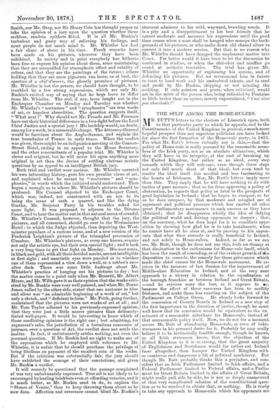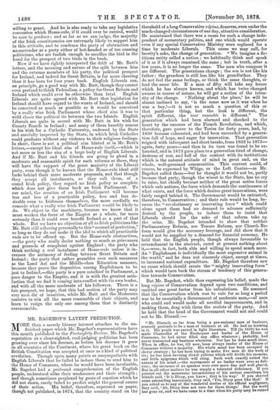THE SPLIT AMONG THE HOME-RULERS.
W. BUTT'S letters to the electors of Limerick open, both -11. to that particular party to which he appeals, and to the Constituencies of the United Kingdom in general, a much more hopeful prospect than any sagacious politician can have looked for since the first formation of the Home-rule party, in 1874. For what Mr. Butt's letters virtually say is this,—that the policy of Home-rule is really pursued by the reasonable mem- bers of the Irish party, not as an absolute ultimatum, which they will have in its integrity, at the cost of breaking up the United Kingdom, but rather as an ideal, every step towards which they will welcome, even though these steps not only fall much short of that ideal, but even tend to render the ideal itself less needful and less fascinating to the hearts of Irishmen. Nay, Mr. Butt's letters imply more than this. They imply that he will have nothing to do with tactics of pure menace ; that so far from approving a policy of obstruction, he regards that policy as fatal to the prospects of good legislation in Ireland ; that he hopes to conquer, so far as he does conquer, by that moderate and mingled use of argument and political pressure which has carried all other great Parliamentary movements to such success as they have obtained ; that he disapproves wholly the idea of defying the political world and driving opponents to despair ; that, on the contrary, what he does hope for is to conciliate oppo- sition by showing how glad he is to take instalments, when he cannot have all he aims at, and by proving to his oppon- ents that what they concede is really beneficial to Ireland, and not solely to Home-rulers. Indeed, as far as we can see, Mr. Butt, though he does not say this, feels no dismay at that diminution in the enthusiasm for Home-rule itself, which has been the result of conceding, or of the evident growth of the disposition to concede, the remedy for those grievances which made the chief excuse for the Home-rule movement. He re- joices in the measure of last Session for the improvement of Middle-class Education in Ireland, and at the very near approach to a victory in relation to the equalisation of the borough franchise as between Ireland and Groat Britain, —and he rejoices none the less, as it appears to is, because the effect of these successes has been to mollify Irishmen, and make them less exacting on the subject of the Parliament on College Green. He clearly looks forward to the concession of County Boards in Ireland as a new step of the first importance in the direction of justice, though he must well know that its concession would be equivalent to the en aetment of a reasonable substitute for Home-rule, instead of that unreasonable policy itself. Now, we do not for a moment accuse Mr. Butt of abandoning Home-rule, or even of luke- warmness in his personal desire for it. Probably he may really believe it to be intrinsically feasible enough, though he knows, as all Irish statesmen know, that the objection of the United Kingdom to it is so strong, that the great majority of Englishmen and Scotchmen would far rather cut Ireland loose altogether, than hamper the United Kingdom with so cumbrous and dangerous a bit of political machinery. But though Mr. Butt probably thinks this a prejudice, and con- siders that an Irish Parliament limited to Irish affairs, and a Federal Parliament limited to Federal affairs, and a Parlia- ment for Great Britain limited to the affairs of Great Britain, might really pull side by side, he is not so deeply enamoured of that very complicated solution of the constitutional ques- tion as to be resolved to obtain that, or nothing. Ile is ready to take any approach to Home-rule which his opponents are willing to grant. And he is also ready to take any legislative concession which Home-rule, if it could ever be carried, would be sure to produce ; and as far as we can judge, the majority of the Irish constituencies are extremely likely to support him in this attitude, and to condemn the party of obstruction and no-surrender as a party either of hot-headed or of too cunning politicians, who are foolish enough to sacrifice the bird in the hand for the prospect of two birds in the bush.
Now if we have rightly interpreted the drift of Mr. Butt's letters, and the meaning and nature of the split between him and the extreme members of his party, the political prospect for Ireland, and indeed for Great Britain, is far more cheering than it has been for four years back. English Liberals can, on principle, go a good way with Mr. Butt, though they cannot even pretend to think Federalism a policy for Great Britain and Ireland which could ever be otherwise than fatal. English Liberals are quite agreed with Mr. Butt that legislation for Ireland should have regard to the wants of Ireland, and should be conceived as much as possible as it would be conceived by a really wise Irish Parliament whose chief aim it was to weld closer the political tie between the two Islands. English Liberals are quite in accord with Mr. Butt in his wish for County Boards in Ireland ; and many of them heartily concur in his wish for a Catholic University, endowed by the State and carefully inspected by the State, in which Irish Catholics could graduate without any violence to their religious feelings. In short, there is not a political aim hinted at in Mr. Butt's letters,—except his ideal aim of Home-rule itself,—which is not more or less the aim of a large body of English Liberals. And if Mr. Butt and his friends are going to plead in a moderate and reasonable spirit for such reforms as these, they will have the support of the great majority of the Liberal party, even though it be known that the Home-rule ideal still lurks behind their more moderate proposals, and that though they accept all instalments, as they call them, of a sound Irish policy, they regard no Irish policy as complete which does not give them back an Irish Parliament. To our mind, the creation of an Irish Parliament will become less and less of a practicable policy, less and less de- sirable even to Irishmen themselves, the more cordially we concede what a really wise Irish Parliament would be likely to do. We object to the machinery, because we know that it must weaken the force of the Empire as a whole, far more seriously than it could ever benefit Ireland as a part of that whole. But we have no objection at all to Irish politicians like Mr. Butt still adhering personally to this" counsel of perfection," so long as they do not make it the idol to which all practicable ends are to be offered up. But the Home-rule obstructives, —the party who really desire nothing so much as grievances and grounds of complaint against England ; the party who think nothing a real instalment of Home-rule unless it in- creases the acrimony of feeling between Great Britain and Ireland ; the party that rather grumbles over such measures as the Land Act and the Middle-class Education measure, because they prove the disposition among Englishmen to be just to Ireland,—this party is a pure mischief to Parliament, a 'pure danger to the Empire, and it is with the greatest satis- faction that we find it coming into conflict with its own leader, and with all the more moderate of his followers. There is a fair prospect, we hope, that this bad section of the party may very soon die of inanition, while Mr. Butt and the Moderates contrive to win all the more reasonable of their objects, and learn to resign the only one among them that is distinctly unreasonable.



































 Previous page
Previous page